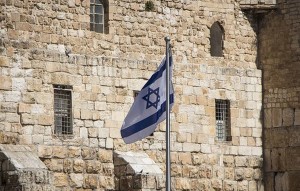“It’s a cherished community custom.”
 West Hempstead, New York, April 29 – Israel’s Chief Rabbinate long ago ordained the recitation of a series of laudatory and thanksgiving Psalms on the anniversary of Israel’s statehood announcement in 1948, and some synagogues have ever since enhanced that practice with an accompanying argument over the permissibility of reciting the benediction that normally precedes those Psalms as prescribed in the Talmud for certain occasions.
West Hempstead, New York, April 29 – Israel’s Chief Rabbinate long ago ordained the recitation of a series of laudatory and thanksgiving Psalms on the anniversary of Israel’s statehood announcement in 1948, and some synagogues have ever since enhanced that practice with an accompanying argument over the permissibility of reciting the benediction that normally precedes those Psalms as prescribed in the Talmud for certain occasions.
At the Young Israel of West Hempstead, on Long Island, worshipers have embraced the debate over saying the benediction before the recitation of Psalms 113-118, known as “Hallel” – “Praise” – since the synagogue’s establishment in the 1950’s. While the Talmud prescribes the chanting of Hallel for any national deliverance from existential danger, for many centuries its recitation occurred only on certain festivals. Reluctance to depart from that pattern has characterized the argument over Hallel on Yom HaAtzma’ut, despite general agreement in orthodox and modern-orthodox circles that the reestablishment of Jewish sovereignty in the Jewish homeland represents an occasion of epic significance and fulfillment of Biblical prophecy. In keeping with ancient Jewish tradition, debate has become an integral part of the ritual.
“It’s been like this as long as I can remember,” recalled longtime member Al Bodoff. “We moved in the early seventies, and every Yom HaAtzma’ut, as soon as the Amidah ends, people get edgy, ready to defend either their insistence that the establishment of Israel is a bona fide national deliverance that answers to the Talmud’s description of when it’s recited, or that we’re not allowed to deviate from the set of established calendar occasions, so reciting the blessing means taking God’s name in vain. Then eventually the hubbub dies down and everyone does it as they think proper. It’s a cherished community custom.”
Some attendees recite the passages in the typical place in the liturgy for their insertion, whereas others wait until after the service to add them, but that practice has fallen out of favor as the two major factions gained ground, observed Assistant Rabbi Josh Goller. “Back when I was in grade school [at the Hebrew Academy of Nassau County] we had a similar thing,” he reminisced. “The administration set aside a few moments to made a big deal out of the technicalities, trying as hard as possible not to stake out a solid position of its own, even if an hour later there was a big celebratory breakfast with blue-and-white-frosted cupcakes, so we knew what they really did believe.”
Please support our work through Patreon.




